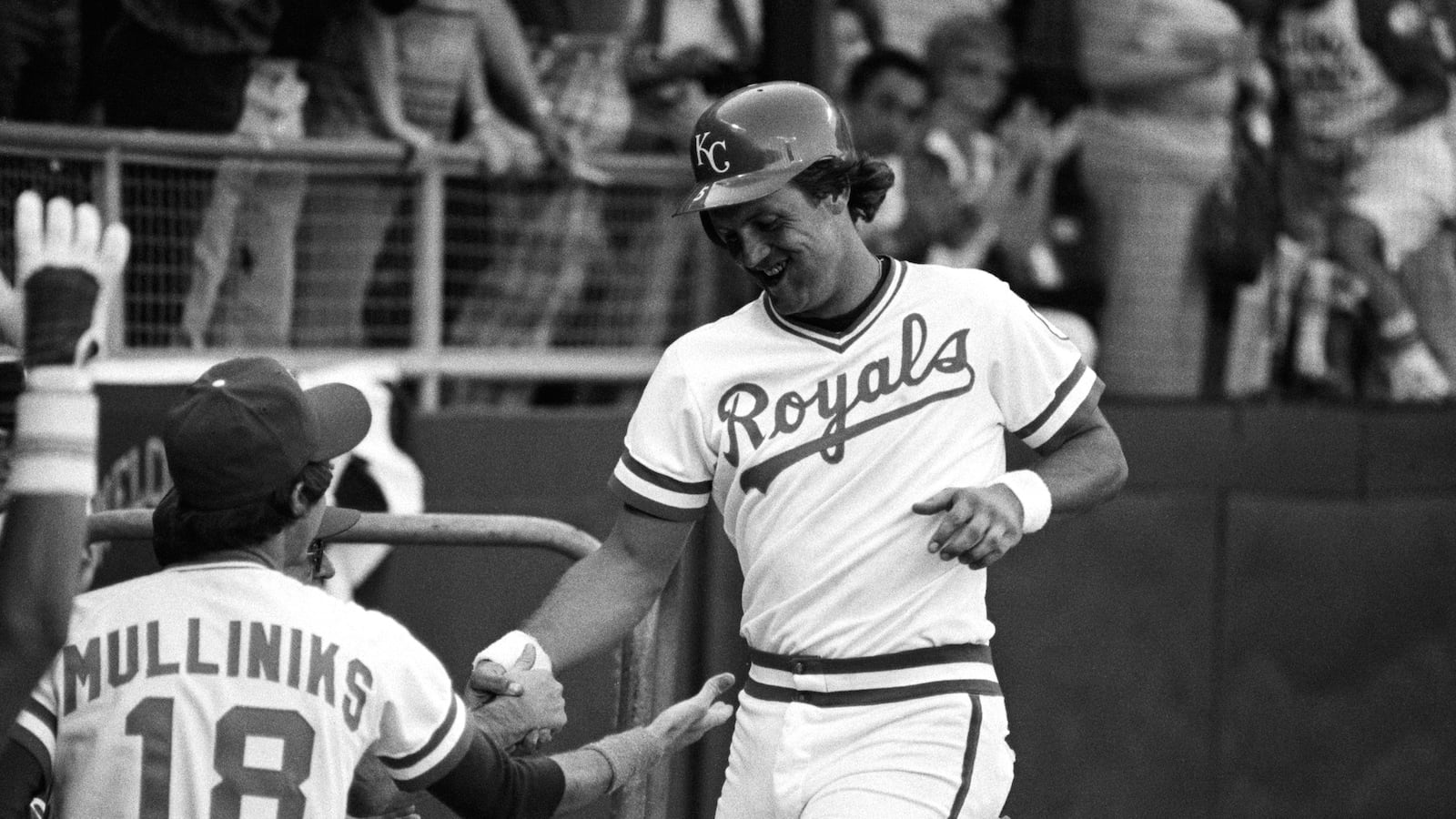On July 24, 1983, George Brett hit a deep home run with two outs in the top of the ninth at Yankee Stadium that put his Kansas City Royals ahead. That lead lasted until Yankees manager Billy Martin famously—or infamously, to everyone except the most diehard Yankees fans—complained that Brett had too much pine tar on his bat.
The umpire agreed and called Brett out—based an obscure rule that pine tar, which some batters used to improve their grip, could not go farther than 18 inches from the bottom of the bat. Brett threw a tantrum to end all tantrums, and the whole things wound up in Major League Baseball’s front office and eventually in court. The home run counted, and the Royals won.
Longtime New York sportswriter Filip Bondy, who covered the pine tar incident and remembers it well, has now written a book about it, The Pine Tar Game. On the occasion of tonight’s Game 3 of the World Series between the New York Mets and the Kansas City Royals, with the Royals now two games up, we chatted with Bondy about baseball past and present.
You were in the press box at Yankee Stadium that day. Did the reporters know immediately that something big and historic was happening?
Filip Bondy: We didn’t really know what was happening at first. It was confusing at the beginning. Billy Martin was talking to the umpires, and we weren’t sure what he was talking about. Once the umpires started to measure the bat against the plate, we figured it out pretty quickly. We realized it was something special, something quirky and weird. You live for those kind of stories. And the tantrum was epic. I still think it was the best tantrum in professional sports that I’ve ever seen.
So Billy Martin, who was the Yankees manager, goes out on the field and complains about the bat. How did he even know what the bat looked like?
Martin was tipped off by Graig Nettles, the third baseman. Nettles remembered that his Yankees teammate Thurman Munson had had an RBI single reversed into an out a couple of years earlier, so he kept that ruling in mind. And everyone knew that George Brett was kind of a bat slob. He kept pine tar all over the place.
Why is having pine tar so far up the bat considered an advantage for a hitter?
It isn’t. It was a stupid rule and an ambiguous rule. It was put into effect because cheap owners didn’t want to replace baseballs that were soiled by foul tips or by pine tar. Calvin Griffith, who was the owner of the Minnesota Twins, lobbied to have the rule put in to save money. It’s hard to believe today that the cost of the baseballs would bother an owner, but the economies then were very different.
So what was the result after all the appeals? Did the Royals win that game?
Yes. The American League president, Lee MacPhail, ordered the game resumed from the point after the home run, when the Royals were up by a run instead of behind by a run. The Yankees did everything they could to avoid resuming the game. They took it to court. Roy Cohn, the famous Communist hunter, represented the Yankees in court. I watched the whole thing. An appellate judge in Manhattan simply said, “Play ball,” and the Yankees lost.
Bill Martin was the funniest thing about the resumption. He put Ron Guidry, his ace pitcher, in centerfield. He had Don Mattingly at second base. He had his pitcher appeal and say that George Brett three weeks earlier had missed first and second base when he was rounding the bases. It was a whole new umpiring crew who would have had no idea if George Brett touched base. What Martin didn’t figure on was that a genius in the American League office named Bob Fishel foresaw this moment. Out of one of the umpires’ pockets came an affidavit signed by the previous umpiring crew that said George Brett had touched all the bases.
Have you seen the video? Did he touch all the bases?
Oh sure, there was no doubt. At that point, Martin gave up, went into his office, and watched a rerun of Barney Miller instead of watching the rest of the game.
You were covering the game for the Bergen Record, which was before you had gone to the New York Daily News.
I changed jobs between the game and the resumption of the game. I had to do my research for the book at two newspapers. I researched on microfiche at the Bergen Record’s library to see how I covered the original game, and then I went to the Daily News archives to see how I covered the court hearings and the resumption. It was interesting to look back at how my life had changed during the span of this happening.
Have you talked to George Brett since the book came out?
I did. I was in Kansas City on the book tour, and much to my surprise George Brett was at the very first event. I really wasn’t sure what his reaction would be. There’s a lot of personal stuff in the book, and it’s one thing to talk to someone before a book is published and another thing to talk to them after. He said he liked it a lot. Even though it detailed his rocky relationship with his father and some of his mistakes in the field during the playoffs, it also talked about him as perhaps the greatest hitter of his generation.
And he works in the Royals’ front office now?
Yeah, he’s an executive vice president. He threw out the first pitch at Game One of the World Series this week and did a pretty good job of it. Every once in a while he talks to the players, and a few years ago he was actually a hitting coach for a while. He said he’s not good at giving pep talks because he tells the players he doesn’t care if they go 6-156 as long as the six wins are against the Yankees!
You wrote in the book about the Kansas City Monarchs, which was one of the major Negro League teams. I didn’t realize that they played all the way into 1965. You think about Major League Baseball integrating in the ’40s.
It was fading fast. Ernie Banks got his start in Kansas City. Jackie Robinson got his start in Kansas City. When those players and other players went on to the major leagues, it took a big chunk out of the Monarchs.
How did the Royals wind up in Kansas City?
The Philadelphia Athletics moved to Kansas City in 1954, and they were a terrible team. Every time they had a good player, they traded him to the Yankees because the Yankees owner and the Kansas City owner had been business partners, which was very fishy. That’s how Roger Maris ended up in New York. In 1968, the Athletics moved to Oakland, and there was a lobbying effort to get an expansion team in Kansas City. Within a year, that happened and became a model franchise.
Do this year’s Kansas City Royals have much in common with that 1983 team?
The 1983 team were smart hitters—very patient as a group. They were also playing in a pitcher’s park and they had solid starting pitchers, so there were some similarities. There is no George Brett on this year’s team, but there’s really no George Brett on any team. He still holds the all-time record for batting average with runners in scoring position. He was the best clutch hitter in baseball.
Do you see any future Hall of Famers on this Royals team?
It’s so early to tell. This is such a young team. You’ve got guys with potential like Lorenzo Cain and Eric Hosmer. This is a team that had a losing record 15 out of 16 years until two years ago, so the city had really suffered with them. When the owner finally saw that they were close to being competitive, he went out and got the players he needed to get.
Do you still live in New York?
Yeah.
So would you rather see the Mets or the Royals win the World Series?
I don’t really root for one team or another. I kind of have an affection for Kansas City because of my experience with the book, and they treated me very well when I was out there. I would like to see them do well. I was never a Mets fan growing up. I grew up a Chicago Cubs fan, and the Mets were kind of a rival to the Cubs. I’m very quietly pulling for the Kansas City Royals.
You wouldn’t believe the arrogance in New York at the beginning of this series. If you listened to talk radio, you would have thought that the Mets and their pitching staff would have swept the Royals without any problem. The Mets have a great young pitching staff, but the Royals are a very tough out, as they have proven again and again in the playoffs.






